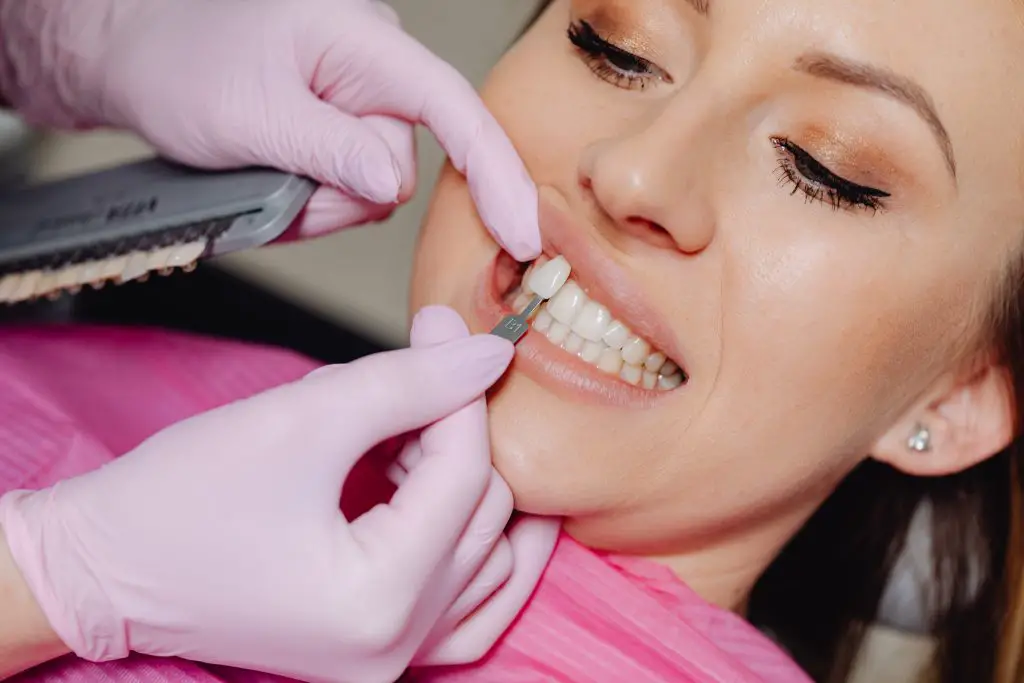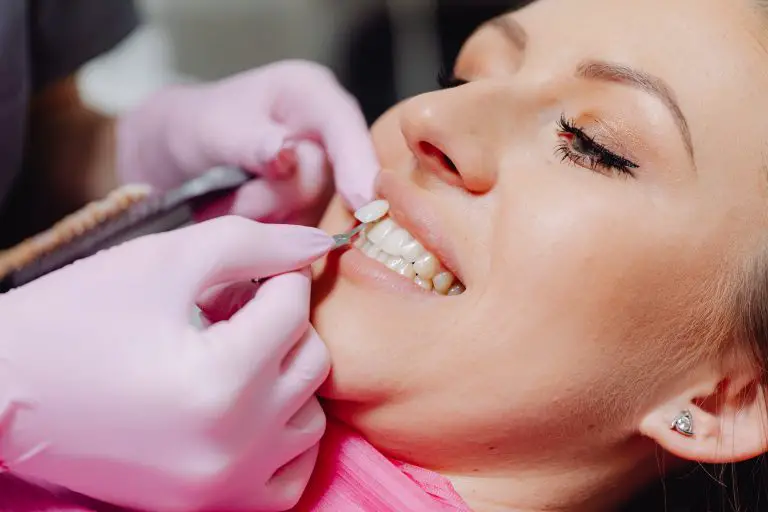A perfect smile flashing those pearly white teeth is something highly desirable.
Those with chipped, broken, malformed, or highly discoloured teeth often hold back from smiling whole-heartedly, concerned about showing their natural teeth. If you’re looking for your dream smile, you could consider getting veneers – one of the most commonly sought cosmetic dentistry procedures.
What Are Veneers?
Dental veneers are permanent changes that mask natural tooth imperfections, including stained or broken teeth. The porcelain veneers or resin composite materials are bonded to the front surface of the teeth using a special bonding cement and replicate the feel and appearance of natural enamel. This changes the features of your natural teeth, including shape, size, colour, or length, and improves your smile with the appearance of whiter and straighter teeth.
Porcelain Veneers
A thin layer of porcelain, shaped or coloured to suit your requirements, goes over the teeth’ front portion. These last for about ten years before requiring replacement with a new set.
Do Veneers Ruin Your Real Teeth?

No, they don’t ruin your natural teeth; rather, they enhance the beauty of your teeth. Upon meeting with any cosmetic dentists, you’ll realise that porcelain veneers are designed and fabricated for a perfect, custom fit.
These veneers are attached to your natural teeth with a bonding material that hardens under a special light. After the bonding procedure, the veneers are shaped and polished by the cosmetic dentist for a perfect result.
The bonding material isn’t harmful to your natural teeth; attaching the veneers doesn’t harm or damage the teeth. Since porcelain veneers aren’t made of enamel, they prevent stains, unlike normal teeth. The incredibly hard veneers are resistant to damage more than your actual teeth. Contrary to causing any harm, these are more resistant to staining and damage than real teeth.
Pros
- They’re specifically moulded on the teeth for a perfect fit.
- Porcelain veneers are ceramic and have a smooth and impervious surface, making them resistant to permanent stains, including those caused by coffee, wine, or even cigarettes.
- Masking dental flaws, like crooked, stained, or damaged teeth, helps improve an individual’s smile, appearance, and self-confidence.
- They can fix minor cosmetic dental problems. However, it’s not a replacement for orthodontic treatment, and a dental professional might refer you to an orthodontist rather than placing veneers.
- Enamel that’s damaged by rigorous brushing, acidic food, beverages, etc., can be replaced by veneers.
Cons
- Depending on the state of your teeth, your jaw, and how many veneers are needed, it is often an expensive cosmetic dentistry procedure.
- Dental veneers are unsuitable for people with a history of gum disease, weakened enamel, tooth decay, or other dental conditions. You could consult with a cosmetic dentist to determine if you’re a suitable candidate to get veneers.
- Veneers are permanently bonded, hence irreversible. You need to be sure about getting veneers before going through the procedure.
- The veneering process requires the removal of enamel, hence increasing tooth sensitivity to hot and cold food and beverages.
- Although unlikely, veneers could dislodge and fall off, chip, or crack. Clenching and grinding teeth must be avoided to ensure this doesn’t happen. Also, anything that puts extra pressure on your teeth, such as biting your nails, chewing on pencils, or other hard items, must be avoided.
- With veneers on, tooth decay is still a possibility. This mandates complete coverage of the tooth with a crown.
The Procedure
Before the actual procedure, you’ll need to pay a couple of visits to the dentist: for consultation and to make the veneers.
Dental Consultation
The first step is the consultation will involve the dentist examining your teeth to ensure you’re a suitable candidate to get veneers on. You will also be informed about the details of the procedure and its limitations. There could be X-rays involved to take your teeth and mouth impressions.
If your teeth are crooked or uneven, your dentist may recommend putting on braces for a while before placing veneers.
Before The Procedure
For accurate sizing of your desired veneers, the next appointment involves your dentist trimming down about half a millimetre of your tooth by removing the enamel with a grinding tool. This is done to make an impression or mould of your teeth sent to a dental laboratory to create the veneers. It takes about 2-4 weeks for the veneers to be made; in the meantime, temporary veneers could be used instead.
The Bonding Procedure
Once the veneers are ready, the next appointment is where your dentist will fix these on your teeth. First, the teeth need a thorough cleaning to ensure there are no bacteria trapped beneath the veneer to cause decay. Next, a rough texture is created on each tooth with a grinding tool to have the veneer placed. This might sound harmful, but it’s completely safe.
The dentist will use dental cement to bond the veneer to the tooth. The cement is hardened instantly with the use of ultraviolet light. You could opt for a local anaesthetic to numb the area before getting the procedure done if you’re sceptical about any pain you might have to endure. However, the bonding material is safe and causes no harm to your teeth.
Is There Any Throbbing Pain After The Procedure?
There could be some patients who experience sensitivity to the bonding procedure caused by their teeth reacting to the bonding agent. Once the anaesthetic effect subsides, the throbbing pain remains for about six hours and fades away. There could be intermittent waves of dull pain occurring for a few days after the procedure that could be eased with over-the-counter pain medications.
Follow-Up
Once the veneers have been fixed, your dentist may ask for a follow-up visit to check on your gums and veneer’s placement after a couple of weeks. You’ll also be informed about the proper aftercare for your dental veneers. While they don’t require special care, following good oral hygiene, including brushing, flossing, and rinsing with mouthwash, is essential.
Final Thoughts
The simple procedure of placing porcelain veneers results in beautiful, healthy teeth that have improved resistance to stains and damage. Provided that you’re aware of the pros and cons of this dental treatment, you can make an informed choice about how many veneers you would like to get. Rest assured, you’ll have a long-lasting, beautiful smile, provided you are careful not to cause any damage to the veneers.

